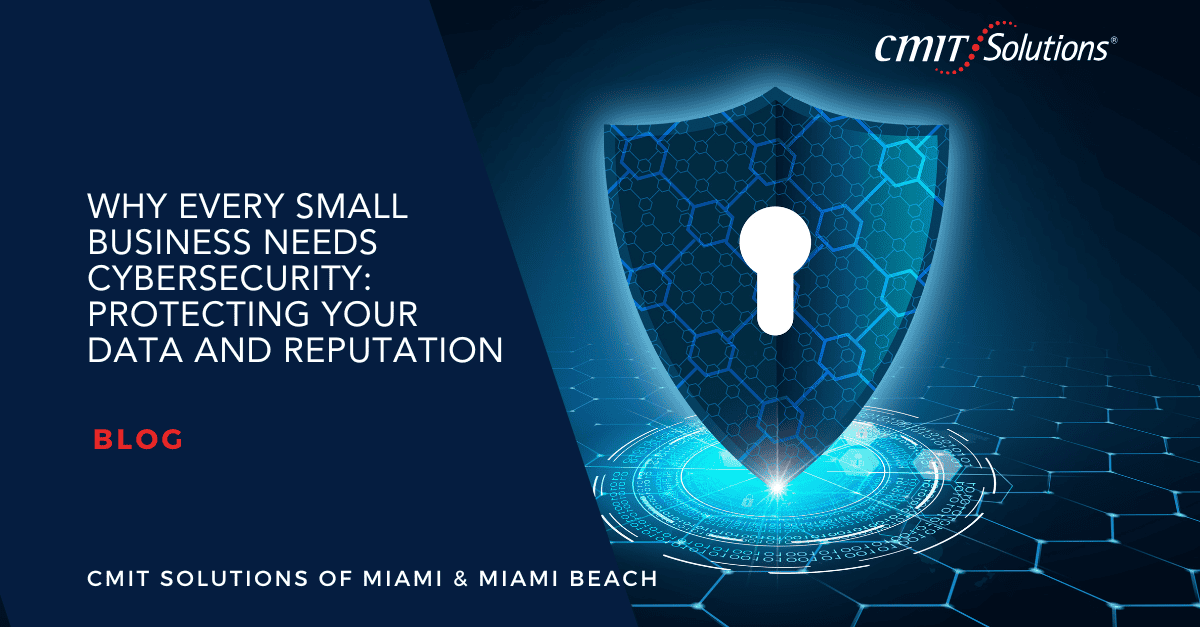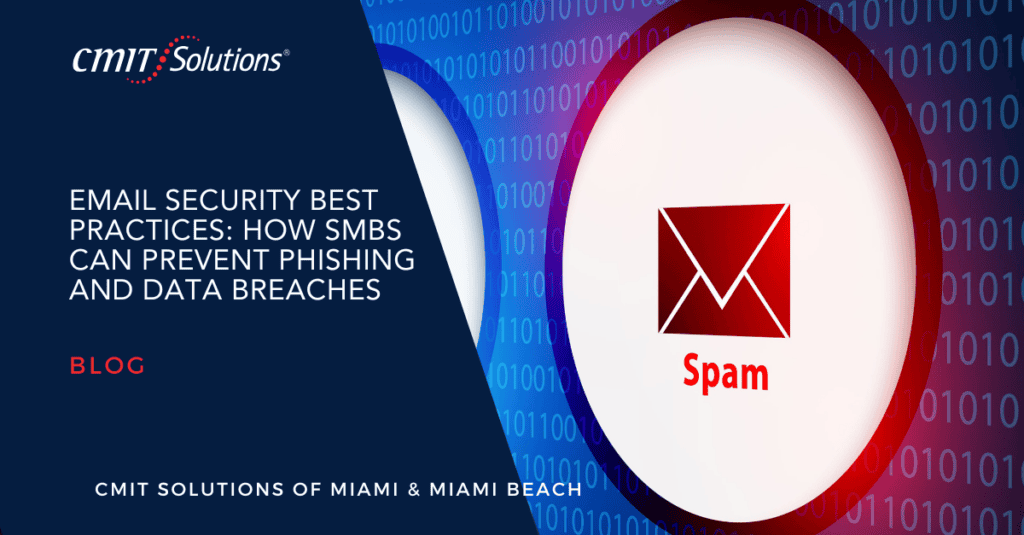Cybersecurity is no longer optional for small businesses. With the increasing number of cyber threats, small businesses in Miami and Miami and Miami Beach face significant risks that can lead to data breaches, financial losses, and reputational damage. Many business owners believe that cybercriminals only target large corporations, but studies show that nearly half of all cyberattacks affect small businesses. Without strong cybersecurity solutions, businesses risk losing customer trust, facing legal penalties, and experiencing operational downtime.
This blog explores why cybersecurity is essential for small businesses and provides actionable strategies to strengthen security measures.
The Rising Cybersecurity Threats for Small Businesses
Many small business owners assume that hackers won’t target them due to their size. However, cybercriminals specifically look for companies with weaker network management and fewer security defenses. The most common threats include:
Phishing Attacks and Social Engineering
Phishing scams are among the most prevalent cyber threats. Cybercriminals send deceptive emails that trick employees into revealing sensitive information, such as passwords and financial details. These attacks often lead to data breaches, financial fraud, or ransomware infections.
To reduce phishing risks, businesses should implement IT guidance and regular employee cybersecurity training. Employees should be taught how to identify suspicious emails and avoid clicking on unknown links.
Ransomware and Data Breaches
Ransomware attacks involve hackers encrypting business data and demanding a ransom for its release. Without a data backup and disaster recovery strategy, businesses may be forced to pay large sums to regain access to their files. In worst-case scenarios, they lose critical data permanently.
Regular cloud services and strong endpoint security can mitigate the risk of ransomware attacks. Small businesses should also invest in compliance solutions to ensure data protection regulations are met.
The Cost of Ignoring Cybersecurity
A cyberattack can lead to more than just financial losses. It can disrupt business operations, erode customer trust, and result in significant legal consequences.
Financial Impact
Cyberattacks often lead to direct financial losses through stolen funds, fraud, or ransom payments. However, the long-term effects can be even more damaging. Businesses may face lawsuits, regulatory fines, and increased insurance costs if they fail to comply with data security laws.
Implementing managed IT services ensures that businesses remain protected against these risks. Cybersecurity professionals continuously monitor for threats and provide proactive solutions to minimize financial losses.
Reputational Damage
Customers expect businesses to protect their personal and financial information. A data breach can cause irreparable damage to a company’s reputation. If customer data is compromised, businesses may lose loyal clients and struggle to attract new ones.
With unified communications, businesses can implement secure email encryption and collaboration tools that protect client interactions.
Essential Cybersecurity Strategies for Small Businesses
To effectively protect against cyber threats, small businesses must take a proactive approach. Below are critical cybersecurity strategies every business should implement.
1. Strengthen Network Security
A company’s network infrastructure is a prime target for cybercriminals. Weak security configurations can lead to unauthorized access, malware infections, and data breaches.
Key steps for enhancing network security include:
- Installing firewalls and intrusion detection systems
- Using secure Wi-Fi networks with strong encryption
- Implementing multi-factor authentication (MFA) for all accounts
Partnering with network management experts helps businesses monitor and secure their IT infrastructure against cyber threats.
2. Implement a Robust Data Backup Plan
Losing business data can be catastrophic. Small businesses should establish a data backup and disaster recovery plan to ensure they can quickly restore lost files in case of a cyberattack or system failure.
Best practices for data backup include:
- Automating regular backups to cloud storage
- Keeping multiple copies of essential files
- Encrypting backup data to prevent unauthorized access
Cloud services provide scalable storage options with built-in security measures, ensuring businesses have access to secure and reliable backups.
3. Secure Cloud Applications and Remote Work Environments
Many small businesses rely on cloud-based software to manage operations. However, cloud platforms must be properly secured to prevent unauthorized access.
Key cloud security measures include:
- Enforcing strict access controls and role-based permissions
- Regularly updating software to patch vulnerabilities
- Encrypting data stored in the cloud
With the rise of remote work, businesses must also secure virtual communication channels. Unified communications solutions provide secure VoIP, video conferencing, and collaboration tools that protect company data.
4. Maintain Compliance with Data Protection Laws
Failure to comply with industry regulations can result in heavy fines and legal penalties. Small businesses must stay updated on data protection laws relevant to their industry.
Compliance best practices include:
- Conducting regular security audits
- Encrypting sensitive customer information
- Implementing access controls to limit data exposure
Businesses should work with compliance specialists to ensure that their cybersecurity strategies align with regulatory requirements.
5. Invest in IT Procurement and Cybersecurity Tools
Outdated technology poses security risks. Small businesses must invest in IT procurement to acquire up-to-date software and hardware that includes advanced cybersecurity features.
Essential cybersecurity tools include:
- Antivirus and anti-malware software
- Endpoint detection and response (EDR) solutions
- Secure email gateways to block phishing attempts
Upgrading to modern IT solutions reduces security vulnerabilities and enhances overall business performance.
The Role of Managed IT Services in Cybersecurity
Many small businesses lack the resources to maintain a full-time IT security team. Managed IT services offer a cost-effective solution by providing expert cybersecurity support, proactive monitoring, and rapid threat response.
With managed IT services, businesses gain:
- 24/7 threat detection and incident response
- Regular system updates and patch management
- Cloud security and backup solutions tailored to business needs
Working with an experienced IT partner ensures businesses stay ahead of cyber threats while maintaining operational efficiency.
Conclusion
Cybersecurity is not a luxury—it is a necessity for small businesses. The increasing number of cyber threats makes it crucial for business owners to take proactive steps in protecting their data and reputation. By implementing strong network security, cloud protection, data backup, and compliance measures, businesses can mitigate risks and enhance their overall security posture.
Investing in managed IT services ensures continuous protection, allowing businesses to focus on growth without worrying about cyber threats. With a trusted cybersecurity partner, small businesses in Miami and Miami and Miami Beach can operate confidently, knowing that their data and customers are secure.
For expert cybersecurity solutions, contact CMIT Solutions of Miami and Miami Beach today.




